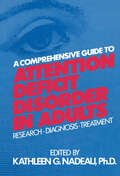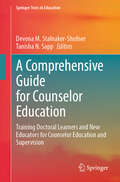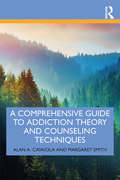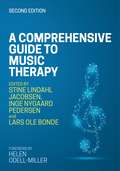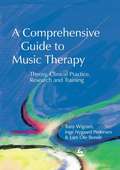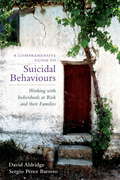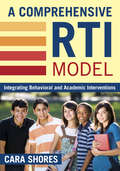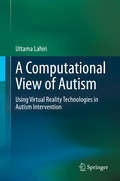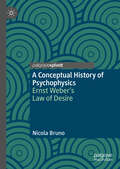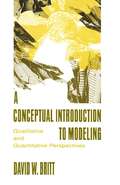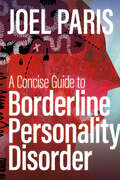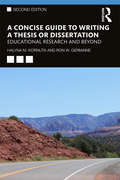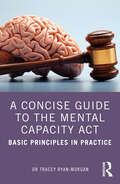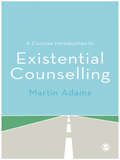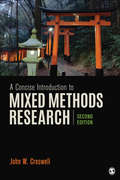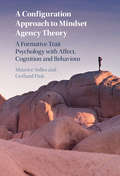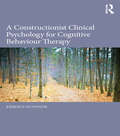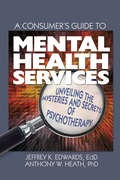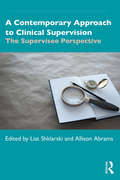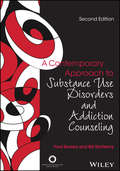- Table View
- List View
A Comprehensive Guide To Attention Deficit Disorder In Adults: Research, Diagnosis and Treatment
by Kathleen G. NadeauThis groundbreaking volume, written by pioneering clinicians and researchers firmly convinced of the neurobiological underpinnings of ADD in adults, is the first to provide broad coverage of this burgeoning field. Written for professionals who diagnose and treat adults with ADD, it provides information from psychologists and physicians on the most current research and treatment issues regarding our understanding of ADD as a neurobiological disorder. According to the contributors, ADD in adults may be responsible for difficulties ranging from minor attention, memory, and organization problems in well-functioning adults to drug abuse and criminal behavior. A Comprehensive Guide to Attention Deficit Disorder in Adults begins by addressing the history of ADD and the evolution of our understanding of the disorder. The neurobiology of ADD is examined, laying a solid foundation for the clinician to develop a scientific understanding of this complex syndrome. The assessment and differential diagnosis of ADD is explored from the perspectives of a variety of specialists in the field. This includes an exploration of the interrelationships between attention deficit disorder and other neurodevelopmental disabilities that may interact with ADD to affect cognitive functioning, and an examination of the connections between ADD and a host of psychiatric conditions. Also covered is the process of differential diagnosis from a neurological perspective, which will help the non-medically trained clinician better to determine when a complete neurological evaluation seems warranted in the assessment process. Authors examine ADD with and without hyperactivity and describe a wide range of assessment tools that can be useful in developing a full diagnostic picture of different conditions that must be addressed in treating adults with the disorder. A wealth of experience, highly practical suggestions, and an optimistic outlook are the hallmark of the section on treatment. The authors strongly recommend a multifaceted treatment plan combining medication, psychotherapy, and addressing the pervasive self-esteem issues which typically haunt the adult whose condition has gone untreated. Specific treatment issues for Adults with ADD are also discussed. These include:- * the development of practical life management skills * the difficulties in relationships * ADD within the context of marriage and family * and higher education and the workplace. The volume concludes with a discussion of the legal implications of the diagnosis of ADD in adults as it pertains to education and employment, the important role of support groups for adults with ADD, and a thought-provoking examination of current and future research including the need for increased public recognition of ADD in adults. A Comprehensive Guide to Attention Deficit Disorder in Adults is a pioneering volume that will bring the most current information available to the attention of those able to help adult ADD sufferers...vocation and rehabilitation counselors, and numerous psychotherapists who recognize symptoms of depression and anxiety, but perhaps overlook the underlying attention deficit disorder. It will stimulate the interdisciplinary research that is the key to increasing knowledge and educate those who can truly make a difference.
A Comprehensive Guide for Counselor Education: Training Doctoral Learners and New Educators for Counselor Education and Supervision (Springer Texts in Education)
by Devona M. Stalnaker-Shofner Tanisha N. SappThis book prepares doctoral learners and new counselor educators to enter into the profession of counselor education and supervision. The work outlines the total experience of teaching in counselor education by providing a practical guide for navigating higher education using best practices grounded in research and based on the lived experiences of seasoned counselor educator contributors. Using case scenarios, points of reflection, as well as the professional and personal accounts of current educators, this book serves as a soup-to-nuts guide outlining current best practices in counselor education. Written from a social justice perspective with efforts to emphasize diversity, equity, inclusion, accessibility, and belonging, more than 70% of the textbook contributors identify as Black, Indigenous, or People of Color (BIPOC). Additionally, all contributors identify as female with varying sexual identities, physical body sizes, and abilities, thus disrupting the dominant narrative. The chapters range in scope and cover topics such as best practices and strategies for teaching praxis, curriculum development, and strategies to develop CACREP specialization programs based on the 2024 CACREP standards and extant research. The book also provides chapters addressing recommendations for navigating higher education such as finding and landing the job, the first year as a counselor educator, the promotion and tenure process, and concludes with a section on personal and professional development for new and experienced counselor educators. A bonus feature of this book is the inclusion of a technological component offering a companion website with a repository of activities, exercises, and resources.
A Comprehensive Guide to Addiction Theory and Counseling Techniques
by Margaret Smith Alan A. CavaiolaA blend of theory and counseling techniques, this comprehensive text provides readers with an overview of several major counseling theories and their application to substance use disorders and addiction counseling, along with related techniques and interventions. Chapters incorporate cutting edge evidenced-based research on neuroscience, psychological and sociocultural theories explaining the biopsychosocial influences of substance use disorders, and examine how substance use disorder risk factors can be utilized when assessing someone who may have a substance use disorder. The text additionally helps apply theory to practice, offering intervention techniques and using accessible case studies. Throughout the text, highlighted learning opportunities and key terms further help students to practice and apply the theories, interventions and techniques that the book discusses. Mental health professionals, undergraduate and graduate students alike will benefit from this deft mix of prominent theory, innovative research and accessible case studies.
A Comprehensive Guide to Music Therapy, 2nd Edition: Theory, Clinical Practice, Research and Training
by Helen Odell-Miller Inge Nygaard Pedersen Lars Ole Bonde Stine Lindahl JacobsenMusic therapy as an intervention in medical, educational and many other environments has a rich and diverse history of methods, approaches and models. Consolidating the many components of music therapy, this completely updated edition of A Comprehensive Guide to Music Therapy covers everything students, teachers and practitioners of music therapy need to know.Building upon the work of Tony Wigram and developments within the field of music therapy over the last 15 years, this second edition looks at the theoretical foundation of music therapy, selected models and interventions, how it can be applied in clinical practice, and the recent progress made in research and evidence-based practice. Giving a complete picture of the multifaceted world of music therapy, it is a must-have for music therapy students, teachers and practitioners.
A Comprehensive Guide to Music Therapy: Theory, Clinical Practice, Research and Training
by Tony Wigram Lars Ole BondeMusic therapists, as in medical and paramedical professions, have a rich diversity of approaches and methods, often developed with specific relevance to meet the needs of a certain client population. This book reflects the many components of such diversity, and is a thoroughly comprehensive guide to accessing and understanding the ideas, theory, research results and clinical outcomes that are the foundations of this field. Providing a detailed insight into the field of music therapy from an international perspective, this book enables the reader to see the complete picture of the multifaceted and fascinating world that is music therapy.
A Comprehensive Guide to Suicidal Behaviours: Working with Individuals at Risk and their Families
by David Aldridge Sergio PerezOver a million people commit suicide worldwide every year. Taking an interdisciplinary approach that looks at the person at risk, the family and personal relationships they have and the communities in which they are embedded, this book will help anyone working with suicidal individuals to prevent this major cause of death. Backed up by research and clinical expertise the book clarifies the facts about suicide and debunks the many unfounded myths surrounding the subject. It covers the classifications and manifestations of suicide, as well as the major risk factors, at-risk groups and warning signs. Advice on effective communication and a repertoire of strategies for distress management are offered, not only for supporting at-risk individuals and those who have survived a suicide attempt, but also families coping with bereavement. A final chapter explores the impact of the internet and the digital age on both the propagation and prevention of suicide. This book will be essential reading for anybody working with people at risk of suicide, including clinicians, therapists, psychologists, social and healthcare workers and volunteers working in suicide prevention.
A Comprehensive Guide to Suicidal Behaviours: Working with Individuals at Risk and their Families
by David Aldridge Sergio PerezOver a million people commit suicide worldwide every year. Taking an interdisciplinary approach that looks at the person at risk, the family and personal relationships they have and the communities in which they are embedded, this book will help anyone working with suicidal individuals to prevent this major cause of death.Backed up by research and clinical expertise the book clarifies the facts about suicide and debunks the many unfounded myths surrounding the subject. It covers the classifications and manifestations of suicide, as well as the major risk factors, at-risk groups and warning signs. Advice on effective communication and a repertoire of strategies for distress management are offered, not only for supporting at-risk individuals and those who have survived a suicide attempt, but also families coping with bereavement. A final chapter explores the impact of the internet and the digital age on both the propagation and prevention of suicide.This book will be essential reading for anybody working with people at risk of suicide, including clinicians, therapists, psychologists, social and healthcare workers and volunteers working in suicide prevention.
A Comprehensive RTI Model: Integrating Behavioral and Academic Interventions
by Cara F. ShoresFeaturing interactive exercises and user-friendly tools, this research-based guide helps educators leverage resources and build teams to improve student behavior and academic achievement schoolwide.
A Computational View of Autism: Using Virtual Reality Technologies in Autism Intervention
by Uttama LahiriThis book first explains autism, its prevalence, and some conventional intervention techniques, and it then describes how virtual reality technology can support autism intervention and skills training. The approaches and technologies covered include immersive virtual reality, augmented reality and mixed reality. The tasks covered include emotion recognition, affective computing, teaching communication skills, imparting literacy skills, training for imitation skills, and joint attention skills. Most of the chapters assume no prerequisite knowledge of autism or virtual reality, and they are supported throughout with detailed references for further investigation.While the author is an engineer by profession, with specialist knowledge in robotics and computer-based platforms, in this book she adopts a user perspective and cites many real-life examples from her own experience. The book is suitable for students of cognitive science, and researchers and practitioners engaged with designing and offering technological assistance for special needs training.
A Conceptual History of Psychology: Exploring the Tangled Web
by John D. GreenwoodIn the new edition of this original and penetrating book, John D. Greenwood provides an in-depth analysis of the subtle conceptual continuities and discontinuities that inform the history of psychology from the speculations of the Ancient Greeks to contemporary cognitive psychology. He also demonstrates the fashion in which different conceptions of human and animal psychology and behavior have become associated and disassociated over the centuries. Moving easily among psychology, history of science, physiology, and philosophy, Greenwood provides a critically challenging account of the development of psychology as a science. He relates the remarkable stories of the intellectual pioneers of modern psychology, while exploring the social and political milieu in which they operated, and dispels many of the myths of the history of psychology, based upon the best historical scholarship of recent decades. This is an impressive overview that will appeal to scholars and graduate students of the history of psychology.
A Conceptual History of Psychophysics: Ernst Weber’s Law of Desire
by Nicola BrunoThis book explores the concept of psychophysics and details the development of the ideas which made the mathematisation of desire possible. The experience of desire accompanies us all throughout life, but dealing with it as psychologists and scientists is far from easy. Psychophysics was conceived to help map, mathematically, these unknowable feelings of desire. As such, this book will help to provide an accessible account of psychophysics while telling the story of its creation, which was, in essence, the birth of scientific psychology and contemporary cognitive neuroscience, alongside many of the technologies which characterize the contemporary world. It is a strange and intriguing story, which begins with the German physiologist Ernst Heinrich Weber in the first half of the nineteenth century, and its story will help the reader gain fresh insight into how scientists came to be able to map and quantify complex and private emotional states.
A Conceptual Introduction To Modeling: Qualitative and Quantitative Perspectives
by David W. BrittWhen seeking to test specific hypotheses in large data sets, social and behavioral scientists often construct models. Although useful in such situations, many phenomena of interest do not occur in large samples and do not lend themselves to precise measurement. In addition, a focus on hypothesis testing can constrict the potential use of models as organizing devices for emerging patterns -- summaries of what we believe we know about the dynamics of situation. This book bridges the gap between "quantitative" and "qualitative" modelers to reconcile the need to impose rigor and to understand the influence of context. Although there are many different uses for models, there is also the realistic possibility of doing credible research without their use. A critical reexamination of the assumptions used in quantitatively-oriented models, however, suggests ways to increase their effectiveness as organizers of both quantitative and qualitative data. Students of methods in psychology, sociology, education, management, social work, and public health -- and their instructors -- are increasingly expected to become familiar with both quantitative and qualitative approaches. Unfortunately, they find few vehicles for communication regarding the implications of overlapping work between the two approaches. Using models as organizing devices for a better dialogue between assumptions and data might facilitate this communication process.
A Concise Guide to Borderline Personality Disorder
by Joel ParisA brief, practical guide to the most current research on and treatment for borderline personality disorder (BPD). Borderline personality disorder (BPD) is associated with severe emotion dysregulation, widespread impulsivity, and highly unstable interpersonal relationships. BPD patients often threaten suicide, make attempts, or suffer from chronic suicidal ideation. The disorder is difficult to diagnose because it is complex, straddles multiple domains and often appears alongside several comorbidities. For all these reasons it is exceedingly difficult to treat, and presents a major challenge for mental health providers. In this updated, practical and evidence-based guide, author Joel Paris uses the biopsychosocial model to contextualize and inform diagnosis and treatment for BPD. Chapters describe risk factors associated with BPD, the development of BPD across the lifespan, and how BPD can be managed in therapy. While dialectical behavior therapy (DBT), is the most often studied therapeutic approach with this population, common factors in all approaches can be utilized to help patients regulate emotions, reduce impulsivity, and improve their interpersonal skills. Common challenges such as the length, expense, and general accessibility of treatment are examined in detail, as is as the risk of suicidality.
A Concise Guide to Understanding Suicide
by Pedro Ruiz Stephen H. Koslow Pedro Ruiz Charles B. Nemeroff Stephen H. KoslowSuicide rates continue to increase globally. The volume of research in this field has also expanded rapidly. In A Concise Guide to Understanding Suicide, leading researchers and clinicians provide a concise review of recent literature, report solutions achieved and give practical guidance for patient care to aid understanding and help prevent suicide. Each chapter is highly focused to provide pertinent information covering all major aspects of the field, from epidemiology and theories of causation through to treatment and prevention. This text will educate practicing clinicians, (psychologist, psychiatrists, nurses, counselors, and emergency room personal) and other health care workers and researchers, as well as providing a pathway for undergraduate and graduate students interested in furthering their understanding of the complexities surrounding suicide. Further, the mental health professionals and those in the social sciences will be extremely interested in this monograph, as will the University community, armed forces and interested lay public.
A Concise Guide to Writing a Thesis or Dissertation: Educational Research and Beyond
by Halyna M. Kornuta Ron W. GermaineA Concise Guide to Writing a Thesis or Dissertation provides clear, succinct, and intentional guidelines about organizing and writing a thesis or dissertation. Part I provides an overview for writing a thesis or dissertation. It describes the big picture of planning and formatting a research study, from identifying a topic to focusing on writing quality. Part II describes the framework and substance of a research study. It models the pattern generally found in a formal, five-chapter research study. Each chapter of a thesis or dissertation has a specific purpose, and this book focuses on each in an easy-to-follow structure. Chapter One reviews the headings and contents expected in the introduction of a study. Chapter Two provides advice for writing a literature review. Chapter Three discusses what to include when describing the methodology. These first three chapters form the proposal section of a study. Two additional chapters present results (Chapter Four) and provide discussion and conclusions (Chapter Five). Appendices offer resources for instructors and students, including a rubric for evaluating writing, exercises to strengthen skills in APA format, sample purpose statements, a research planning organizer, and a guide for scholarly writing. The book is designed overall to be a practical guide and resource for students for their thesis or dissertation process.
A Concise Guide to the Mental Capacity Act: Basic Principles in Practice
by Dr Tracey Ryan-MorganThis book provides a clear introduction to the Mental Capacity Act (MCA, 2005), offering an easy reference guide to the complex issues enshrined within the Act to inform the everyday practice of those who need to perform within its parameters as part of their day-to-day work. Bringing together clinical neuropsychology expertise with legal commentary, the book introduces the main principles and presumptions of the MCA (2005) and describes the processes involved in the comprehensive assessment of what can, in practice, be complex issues. It provides learning summaries, flowcharts, checklists and web references for easy to access resources. The chapters also contain a broad range of illustrative case examples with considerable emphasis given to those areas of complexity that are not addressed in current guidance and which often prove contentious in everyday practice, such as how particular forms of brain injury can lead to hidden difficulties with decision-making which can be challenging to assess and evidence in practice. The book is essential reading for trainee nurses, doctors, paramedics, social workers, lawyers, psychologists and health and social care support workers, as well as experienced health and social care professionals such as ward managers and care and nursing home managers who face mental capacity issues in their day to day working role.
A Concise Introduction to Existential Counselling
by Martin Adams'A concise introduction to existential counselling is a superb addition to the literature on existential counselling and psychotherapy. Martin Adams provides an excellent overview of the field for those who are new to it at the same time as distilling key features in a way which will be valuable for experienced practitioners' - Meg Barker, Senior Lecturer in Psychology at the Open University A Concise Introduction to Existential Counselling is just that: a brief and accessible pocket guide to the underlying theory & practice of the existential approach. Addressing everything a new trainee needs to know and do in a way that is entirely accessible and jargon-free, this book: - Provides a short history of the existential tradition - Puts key concepts into contexts, showing how theory translates into practice - Discusses issues in the therapeutic process - Shows how to work effectively with whatever the client brings to the session - Addresses the significance of existential thought in the wider world This book will be the perfect companion to new trainees looking to embark on their path to thinking and practicing existentially. Martin Adams is a practitioner and supervisor in private practice and a Lecturer at the New School of Psychotherapy and Regents College, both in London.
A Concise Introduction to Mixed Methods Research
by John W. CreswellFor students and researchers new to mixed methods, A Concise Introduction to Mixed Methods Research 2e by renowned author John W. Creswell provides a brief and practical introduction to mixed methods. Many graduate students and researchers in the social, behavioral and health sciences may not have the time or resources to read long treatises or stacks of journal articles on mixed methods research. This text quickly describes the basics of setting up and conducting a study using this methodology. Chapters are short and follow the process of research, from ensuring skills for conducting research, acknowledging the steps in planning a study, designing studies with increasing complexity, planning sampling strategies and integration, and writing up the results of your study. Get started in mixed methods quickly with this brief primer.
A Concise Introduction to Mixed Methods Research
by John W. CreswellFor students and researchers new to mixed methods, A Concise Introduction to Mixed Methods Research 2e by renowned author John W. Creswell provides a brief and practical introduction to mixed methods. Many graduate students and researchers in the social, behavioral and health sciences may not have the time or resources to read long treatises or stacks of journal articles on mixed methods research. This text quickly describes the basics of setting up and conducting a study using this methodology. Chapters are short and follow the process of research, from ensuring skills for conducting research, acknowledging the steps in planning a study, designing studies with increasing complexity, planning sampling strategies and integration, and writing up the results of your study. Get started in mixed methods quickly with this brief primer.
A Configuration Approach to Mindset Agency Theory: A Formative Trait Psychology with Affect, Cognition and Behaviour
by Maurice Yolles Gerhard FinkThis book explains psychological, sociopolitical and organisational change in multidisciplinary settings. It shows how advanced techniques of contextual analysis can be applied to complex situations and offers a new cybernetic agency paradigm based on living systems theory. It models, diagnoses, and analyses complex, realworld situations to anticipate patterns of behaviour.
A Constructionist Clinical Psychology for Cognitive Behaviour Therapy
by Kieron P. O'ConnorMost clinical psychologists and cognitive behaviour therapists adopt a perspective which assumes that a client's distress arises from inaccurate perceptions of the external world and that these perceptions are due to the problematic filtering of information about the external world through internal perceptual biases and schemas. A Constructionist Clinical Psychology for Cognitive Behavioural Therapy provides a timely and innovative critique of the dominant trends in CBT theory and practice. It applies a constructionist framework to treatment and offers a constructionist philosophy and methodology to complement existing clinical approaches in cognitive behaviour therapy. <P><P> Kieron O'Connor presents a much needed alternative constructionist framework (addressing both individual and social constructionist ideas) which is laid out in a clear fashion for the clinician. He shows how the framework can be integrated into practice and offers an alternative to viewing psychopathology as an isolated problem which focuses on pathology as a response to internal or external events. He reveals how the new constructionist framework can encourage clinicians to look at the client centred context which creates psychopathology and explore areas and experiences not easily accessible to traditional cognitive behaviour approaches, but which are rendered understandable through a constructionist approach to experience. <P><P> Using extensive case studies, A Constructionist Clinical Psychology for Cognitive Behavioural Therapy provides a constructionist framework approach which complements existing CBT approaches and shines new light on questions as to why some techniques work and others do not. With new tools for case formulation and evaluation, and trainee exercises for beginners, the book will appeal to clinical psychologists, clinical researchers, psychotherapists and other health and mental health professionals
A Consumer's Guide to Mental Health Services: Unveiling the Mysteries and Secrets of Psychotherapy
by Jeffrey K. Edwards Anthony W. HeathA unique consumer resource for understanding mental health treatment With over 250 models of counseling and psychotherapy currently used to treat emotional problems and serious mental illness, figuring out where to look for the right services can be a daunting task. A Consumer&’s Guide to Mental Health Services offers pragmatic solutions for those considering or already beginning treatment. It helps you to make important decisions regarding whether seeing a psychiatrist, a social worker, a counselor, or a psychologist is best for your particular needs. It also explores health insurance and coverage of treatment as well as how long it may take for you to begin feeling like yourself again. This valuable text looks at the intricacies of the mental health care system and provides a helpful summary that is both accessible and useful. If you&’ve ever tried to find help for a major life transition, depression, or anxiety and have been overwhelmed by the options for mental health treatment, you are not alone. A Consumer&’s Guide to Mental Health Services is a unique text that breaks down the vast array of service options with a critical eye so consumers can get the vital information they need in a straightforward and accessible way. This comprehensive text even includes a "Questions to Ask" section that will help you find the right clinician to fit your exact needs. Some of the topics A Consumer&’s Guide to Mental Health Services covers in detail are: causes of mental health problems the three main models of mental health how clinicians who use the different models view mental health types of providers available and the different services they offer talk therapies and medications ethical codes of all professions consumers&’ rights the insurance industry, its history and current role matching treatment to the problem alternatives to therapy and much more! A Consumer&’s Guide to Mental Health Services is a valuable and practical resource for anyone considering or beginning mental health treatment or their family and friends. It is also a useful addition for educators or students working through introductory courses in all of the major mental health fields.
A Contemporary Approach to Clinical Supervision: The Supervisee Perspective
by Liat ShklarskiThe most critical and influential relationship affecting one’s growth as a mental health professional is the relationship between the clinician and the supervisor. Good supervisors breed good therapists. This book goes beyond facts and figures to provide an innovative perspective on the supervision process. Through contributions by seven supervisees and the supervisor they all shared, readers are offered a rare glimpse into what takes place during the supervision hour. This book not only offers insight into the elements integral to effective supervision, but also teaches about the supervisory relationship. With contributors from various disciplines, theoretical orientations, and cultures, it shows how the supervisee and supervisor are able to navigate these differences while still gaining the most from supervision. Topics that are covered include cultural competence in multicultural supervision and remote supervision when it is conducted between clinicians in different countries, as well as an original study by the authors on the experiences of supervisees during the global Covid-19 pandemic and the transition to remote supervision. For mental health professionals who are training to be supervisors or experienced supervisors looking to improve their skills, this book will serve as an invaluable resource for professional development.
A Contemporary Approach to Substance Abuse and Addiction Counseling: A Counselor's Guide to Application and Understanding
by Bill Mchenry Ford BrooksA Contemporary Approach to Substance Abuse and Addiction Counseling provides a basic understanding of the nature of substance abuse and addiction, its progression, and clinical interventions for college/university, school, and community/mental health agency settings.
A Contemporary Approach to Substance Use Disorders and Addiction Counseling
by Ford Brooks Bill McHenryWritten as an introduction to the field of addiction counseling, this text covers the fundamental knowledge and skills necessary to counsel people who are struggling with addiction. Drs. Brooks and McHenry provide a straightforward and holistic approach to treatment and recovery, from the major theoretical underpinnings, to assessment and diagnosis, to relapse prevention and spirituality. With a focus on current clinical applications and how-tos, this book is ideal both for master’s-level addictions courses and mental health clinicians. Topics covered are cultural and gender issues, including work with LGBT clients; drug classifications and referral; assessment, diagnosis, and interview techniques; the continuum from nonuse to addiction; work in college/university, school, and community/mental health agency settings; developmental approaches in treatment; the role of the family; grief and loss in addiction; group counseling; relapse and recovery; spirituality and support groups; addictions training, certification, and ethics; and the importance of counselor self-care. Exploration questions and suggested activities are presented in each chapter. *Requests for digital versions from the ACA can be found on wiley.com. *To request print copies, please visit the ACA website here. *Reproduction requests for material from books published by ACA should be directed to permissions@counseling.org.
